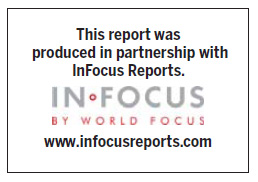News
Construction sector lays foundations for growth
(China Daily)
Updated: 2011-06-10 07:57
 |
Large Medium Small |

Hospitals, schools, houses, highways and other key infrastructure will be built across Ghana
With a growing population that is becoming more affluent thanks to strong economic growth and greater employment opportunities, Ghana is facing a sharp rise in demand for private and public housing, with the market failing to supply sufficient numbers of homes.
"We are definitely in a crisis situation in terms of the housing sub-sector," said Alban S. K. Bagbin, Minister for Water Resources, Works and Housing, whose department is leading efforts to boost capacity.
"We should be developing upwards of 140,000 housing units annually, but are actually only delivering around 40,000 per year and they are mainly through private sector intervention. This has led to a huge housing deficit of approximately 1 million housing units."
Describing this shortfall of accommodation as "dire", Minister Bagbin said officials are working hard to "create the right environment for private sector investment" in the housing market.
"Plenty of new residential estates are being constructed but the challenges are not only financial, as there are problems sourcing locally-made building materials such as bricks," he said. "Imported materials are very expensive so we have tackled the problem head-on and created groups to produce cement.
"In the next few years, we will reduce the housing gap. For the first time, we are putting in place a building code, and we are reviewing our housing policy and looking at legal and institutional frameworks."
Employment everywhere
According to official government estimates, this massive nationwide housing and infrastructure construction program is expected to create as many as 400,000 jobs over the next 5 years, both directly and indirectly.
"All categories of professionals and artisans will be involved," said Minister Bagbin. "Professionals like lawyers, accountants, architects, surveyors, planners are already engaged. Once we start digging, there will be an influx of artisans such as carpenters, masons, painters, dry-wallers, drivers and so on, while food vendors will also flock to the building sites.
"We will create a lot of jobs but the most important thing is getting the necessary industries in place to produce construction materials like cement, steel, iron and aluminum, plus all the haulage and associated transport facilities and operations."
"We are not just talking about building houses but developing communities with safe streets and affordable living. We know the majority of Ghanaians cannot just buy their own homes so we are also looking at rental and leasing units. This is why we are putting together mortgage schemes and home loans through Ghana Commercial Bank and foreign groups."
The former Civil Aviation Authority chairman is adamant that the necessary infrastructure must be in place if the exploration and exploitation of the fledgling oil and gas industry is to be maximized.
"With the help of the Chinese, I would like to see major investment in the roads network as assets must be accessible at all times. We also need to look at constructing an airport in the west of the country so people can fly directly there rather than arrive in Accra and have to drive for miles.
"The government intends to provide the right environment for business and investment to thrive, while also building our capacity as a nation. We only need capital expertise and technology to reap the benefits of the wonderful resources we are blessed with."
Commercial diversification
As Ghana's leading concrete products manufacturer, Osiadan Concrete Products Limited is a major player in the general construction and house-building sector.
As part of the roof tile maker's strategic development, Osiadan plans to move into the textiles industry and set up apparel factories with the help of Chinese enterprises.
Executive chairman, Nana Abrah Adjei, explained: "We want to diversify into garment production - such as police, military and prison uniforms - and cotton cultivation and processing.
"I am looking for private sector companies and banks to help us expand. I am particularly eager to team up with companies from China because I really value the Chinese culture and attitude. They work hard, fast and efficiently.
"I want my children to learn from the Chinese so they can transfer these skills, attitude and knowledge to their children and bless the future of Ghanaians."
Abrah Adjei, who has been at the helm of the Accra-based firm for many years, added: "We have many resources and there are a lot of opportunities here that will please investors tremendously; Ghana is a great place to invest."

(China Daily 06/10/2011 page7)
| 分享按钮 |